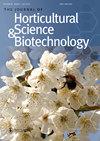番石榴果肉颜色育种现状与机遇
IF 2.1
4区 农林科学
Q2 HORTICULTURE
Journal of Horticultural Science & Biotechnology
Pub Date : 2023-09-20
DOI:10.1080/14620316.2023.2251995
引用次数: 0
摘要
摘要番石榴(Psidium guajava L.)是番石榴科的一员,是继巴巴多斯樱桃和乌拉之后第三丰富的维生素C来源。番石榴有许多药用特性与每一个植物部分有关。彩色番石榴具有额外的营养价值,因为它含有番茄红素、花青素和类胡萝卜素,这些物质赋予其果肉颜色,并作为潜在的抗氧化剂。本文详细介绍了番石榴果肉颜色的种类、果肉颜色的遗传、各种果肉颜色的色素以及这些色素的生物合成途径。番石榴的最新进展表明,类胡萝卜素和花青素对其果肉颜色有重要贡献。番石榴果肉的最终颜色取决于色素的相对比例,即花青素、番茄红素和其他类胡萝卜素。关键词:花青素;瓜石榴红;瓜爪哇;披露声明作者未报告潜在的利益冲突。数据可用性声明本综述中所有图表和表格中的数据均来自不同来源。本文章由计算机程序翻译,如有差异,请以英文原文为准。
Breeding for pulp colour in Guava: current status and opportunities
ABSTRACTGuava (Psidium guajava L.), a member of the family Myrtaceae, is the third richest source of vitamin C after Barbados cherry and aonla. Guava has many medicinal properties associated with every plant part. Coloured guava has additional nutritive value due to its lycopene, anthocyanin, and carotenoid content, which impart colour to its pulp and serve as potential antioxidants. In this review, the various categories of pulp colour in guava, genetics of pulp colour, pigments responsible for various pulp colours, and the biosynthetic pathway of those pigments are presented in detail. The recent advances in guava show that both carotenoids and anthocyanins contribute significantly to its pulp colour. The final pulp colour of the guava depends on the relative proportion of the pigments, i.e. anthocyanins, lycopene, and other carotenoids.KEYWORDS: AnthocyaninsgeneticsGuavalycopenepsidium guajava Lpulp colour AcknowledgementsThis work is supported by ICAR-IARI, New Delhi, 110012, India.Disclosure statementNo potential conflict of interest was reported by the author(s).Data availability statementData presented in all the figures and tables of the review paper are compiled from various sources.
求助全文
通过发布文献求助,成功后即可免费获取论文全文。
去求助
来源期刊
CiteScore
3.90
自引率
5.30%
发文量
67
审稿时长
3 months
期刊介绍:
The Journal of Horticultural Science and Biotechnology is an international, peer-reviewed journal, which publishes original research contributions into the production, improvement and utilisation of horticultural crops. It aims to provide scientific knowledge of interest to those engaged in scientific research and the practice of horticulture. The scope of the journal includes studies on fruit and other perennial crops, vegetables and ornamentals grown in temperate or tropical regions and their use in commercial, amenity or urban horticulture. Papers, including reviews, that give new insights into plant and crop growth, yield, quality and response to the environment, are welcome, including those arising from technological innovation and developments in crop genome sequencing and other biotechnological advances.

 求助内容:
求助内容: 应助结果提醒方式:
应助结果提醒方式:


